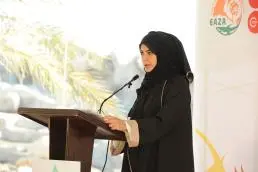PHOTO
The workshop was set up to inform and catalyse action for biodiversity conservation in Sharjah and the UAE as a whole
Sharjah, 11 February , 2016,
The Environment and Protected Areas Authority (EPAA) hosted the 17th Annual International Conservation Workshop for Arabia's Biodiversity (ICWAB) at the Breeding Centre for Endangered Arabian Wildlife in Sharjah from February 8th to 11th. The workshop, hosted under the generous patronage of His Highness Sheikh Dr Sultan bin Muhammad Al Qasimi, Member of the Supreme Council and Ruler of Sharjah, brought experts from around the world together to assess the status of endangered species in the Arabian Peninsula.
The four-day workshop, held in collaboration with the International Union for Conservation of Nature (IUCN) Red List, was set up to expand cooperation between regional and international bodies, and provide information and analyses on the status, trends and threats to species in order to inform and catalyse action for biodiversity conservation.
ICWAB gathered specialists from all corners of the globe, including South Africa, the UK and New Zealand, to address two parallel themes: the conservation status of terrestrial mammals in the Arabian Peninsula and disease surveillance for the region (dealing specifically with the threat of tuberculosis), ruminant nutrition, and mass capture and its complications.
Over the course of the workshop, attendees assessed the status of all marine mammals, including whales, dolphins and dugong, of the Arabian Region, a process which has never been completed before. In addition, they created a regional IUCN Red List assessment of all the terrestrial mammals (excluding bats), which provides an essential baseline for conservation.
The results of the assessment show that many of the larger species are threatened with extinction. The Arabian Tahr, which is only found in UAE and Oman, is endangered, and so are the Arabian gazelle (edmi) and sand gazelle (reem). Many carnivores are categorised as threatened, while the Arabian Leopard has been placed on the Critically Endangered List. During the course of the workshop, conservation measures were recommended for all of these species.
To assist in the preservation of the species listed, the nature reserves of the Arabian Peninsula were reviewed and mapped to provide a database, and gaps identified where more protection is needed. Furthermore, the veterinary workshop reviewed the diseases affecting wild animals, especially herbivores such as gazelles and oryx.
Speaking on the workshop, HE Hana Saif Al Suwaidi, Chairperson of the EPAA in Sharjah, said, "The International Conservation Workshop for Arabia's Biodiversity provides the opportunity for conservationists and veterinarians to come together and share ideas with the common goal of conservation and preservation. A number of topics have been addressed during these workshops over the years, including planning, eco-tourism, and trans-boundary conservation, all of which have led to positive change and advancement in the development of the protected area network in Sharjah. Throughout the course of this year's workshop, we made heartening progress in setting up a regional red list, among other promising developments."
The 17th Annual International Conservation Workshop for Arabia's Biodiversity was led by Dr David Mallon, Co-Chair of the IUCN/SSC Antelope Specialist Group and Senior Scientific Advisor for the Conservation Workshops in Sharjah; Dr Philip Seddon, Professor of Zoology and Director of the Postgraduate Wildlife Management Programme at the University of Otago, New Zealand; Dr Michael Knight, Head of Parks Planning and Development for South African National Parks and Chair of the IUCN/SSC African Rhino Specialist Group; Dr Gerhard Steenkamp, PhD Candidate at the Mammal Research Institute and Senior Lecturer at the University of Pretoria; and Dr Craig Hilton-Taylor, Head of the IUCN Red List Unit in Cambridge, UK.
-Ends-
© Press Release 2016




















